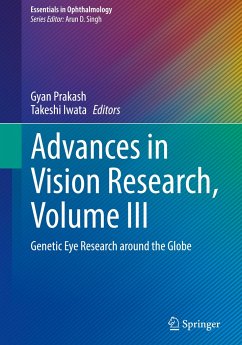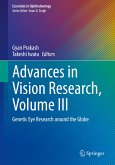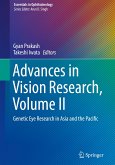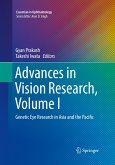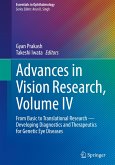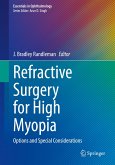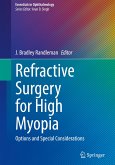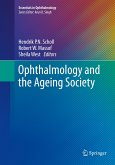Advances in Vision Research, Volume III
Genetic Eye Research around the Globe
Herausgegeben:Prakash, Gyan; Iwata, Takeshi
Advances in Vision Research, Volume III
Genetic Eye Research around the Globe
Herausgegeben:Prakash, Gyan; Iwata, Takeshi
- Gebundenes Buch
- Merkliste
- Auf die Merkliste
- Bewerten Bewerten
- Teilen
- Produkt teilen
- Produkterinnerung
- Produkterinnerung
This third volume, with three supporting editors, broadens its focus on genetic eye research from the Asian to the global scale. New efforts and a new awareness have sparked important discussions on genetic eye research, and new plans are being implemented to identify the genes responsible for numerous eye diseases. The book introduces the latest findings on genetics in eye diseases, gene therapy, and genome-wide association analysis, and the efforts of the Global Eye Genetic Consortium (GEGC). The book's editors have been instrumental in developing strategies for discovering the new genes…mehr
Andere Kunden interessierten sich auch für
![Advances in Vision Research, Volume III Advances in Vision Research, Volume III]() Advances in Vision Research, Volume III104,99 €
Advances in Vision Research, Volume III104,99 €![Advances in Vision Research, Volume II Advances in Vision Research, Volume II]() Advances in Vision Research, Volume II113,99 €
Advances in Vision Research, Volume II113,99 €![Advances in Vision Research, Volume I Advances in Vision Research, Volume I]() Advances in Vision Research, Volume I165,99 €
Advances in Vision Research, Volume I165,99 €![Advances in Vision Research, Volume IV Advances in Vision Research, Volume IV]() Advances in Vision Research, Volume IV112,99 €
Advances in Vision Research, Volume IV112,99 €![Refractive Surgery for High Myopia Refractive Surgery for High Myopia]() Refractive Surgery for High Myopia60,99 €
Refractive Surgery for High Myopia60,99 €![Refractive Surgery for High Myopia Refractive Surgery for High Myopia]() Refractive Surgery for High Myopia82,99 €
Refractive Surgery for High Myopia82,99 €![Ophthalmology and the Ageing Society Ophthalmology and the Ageing Society]() Ophthalmology and the Ageing Society82,99 €
Ophthalmology and the Ageing Society82,99 €-
-
-
This third volume, with three supporting editors, broadens its focus on genetic eye research from the Asian to the global scale. New efforts and a new awareness have sparked important discussions on genetic eye research, and new plans are being implemented to identify the genes responsible for numerous eye diseases. The book introduces the latest findings on genetics in eye diseases, gene therapy, and genome-wide association analysis, and the efforts of the Global Eye Genetic Consortium (GEGC). The book's editors have been instrumental in developing strategies for discovering the new genes involved in many eye diseases. All chapters were written by leading researchers working on eye genetics from the fields of Human Genetics, Ophthalmology, Molecular Biology, Biochemistry, Sensory Sciences, and Clinical Research. Advances in Vision Research, Volume III is a major resource for all researchers, clinicians, clinical researchers, and allied eye health professionals with an interest in eye diseases around the globe.
Produktdetails
- Produktdetails
- Essentials in Ophthalmology
- Verlag: Springer / Springer Nature Singapore / Springer, Berlin
- Artikelnr. des Verlages: 978-981-15-9183-9
- 1st edition 2021
- Seitenzahl: 496
- Erscheinungstermin: 19. Februar 2021
- Englisch
- Abmessung: 260mm x 183mm x 31mm
- Gewicht: 1233g
- ISBN-13: 9789811591839
- ISBN-10: 9811591830
- Artikelnr.: 60113990
- Herstellerkennzeichnung
- Springer-Verlag GmbH
- Tiergartenstr. 17
- 69121 Heidelberg
- ProductSafety@springernature.com
- Essentials in Ophthalmology
- Verlag: Springer / Springer Nature Singapore / Springer, Berlin
- Artikelnr. des Verlages: 978-981-15-9183-9
- 1st edition 2021
- Seitenzahl: 496
- Erscheinungstermin: 19. Februar 2021
- Englisch
- Abmessung: 260mm x 183mm x 31mm
- Gewicht: 1233g
- ISBN-13: 9789811591839
- ISBN-10: 9811591830
- Artikelnr.: 60113990
- Herstellerkennzeichnung
- Springer-Verlag GmbH
- Tiergartenstr. 17
- 69121 Heidelberg
- ProductSafety@springernature.com
Dr. Gyan Prakash is Director of Office of International Program Activities at National Eye Institute (NEI)- National Institutes of Health (NIH), USA. He served as the first Director of Transformational Medical Technologies Initiative (TMTI), a pioneer scientific research and product development program in the US Government with a budget of US$ 1.6 Billion. Before joining the U.S. Gov't, Dr. Prakash served as the Chief Operating Officer and Executive Vice President at AMAR International, a life science program management company in the USA. Previously, he served as the President and CEO of Metastatin Pharmaceuticals. Dr. Prakash earned his international program management experience at Pfizer world headquarters in New York in several leadership roles. He has a PhD in Biomedical Sciences earned at University of Illinois at Urbana-Champaign and MBA in Management and fellowships at UCLA School of Medicine and Centers for Disease Control. He is the founding President of Global Eye Genetics Consortium (GEGC), previously Asian Eye Genetics Consortium (AEGC). Dr. Takeshi Iwata is Director of Molecular and Cellular Biology Division at National Institute of Sensory Organs, National Hospital Organization Tokyo Medical Center in Tokyo, Japan. He is known for his pioneering work in the field of retinal genetics and has worked at National Institutes of Health (NIH)- National Eye Institute (NEI) in Bethesda, MD, USA, in retina genetics laboratory, headed by Dr. George Inana. He and Dr. Inana moved to Bascom Palmer Eye Institute, University of Miami School of Medicine in Miami, Florida and continued working on inherited retinal diseases. Dr. Iwata returned to NEI laboratory headed by Dr. Deborah Carper on another major retinal disease, the diabetic retinopathy. Dr. Iwata earned his PhD at Meijo University in Japan. He is currently serving as President of Japan Eye Genetics Consortium (JEGC) and Global Eye Genetics Consortium (GEGC).
1. Expansion of Asian Eye Genetics Consortium (AEGC) to Global Eye Genetics Consortium (GEGC), Introduction of a global Phenotype-Genotype Database "GenEye" and Launch of New Training Programs at National Eye Institute (NEI).- 2. Global Women's Eye Health: a Genetic Epidemiologic perspective.- 3. Establishing the Chinese Arm of GEGC.- 4. Human material for research: Eye banking, biobanking and ethical access.- 5. Current Understanding of Polypoidal Choroidal Vasculopathy.- 6. Genetics of Age-related macular degeneration (AMD) in Asia.- 7. The contribution of rare allele and Junk Genome in AMD pathogenesis.- 8. Differential genotypes in age-related macular degeneration and polypoidal choroidal vasculopathy: a updated meta-analysis.- 9. Genetic Epidemiology of Quantitative Traits of Primary Open Angle Glaucoma.- 10. Association studies on retina diseases in Chinese population.- 11. Congenital stationary night blindness (CSNB) - an inherited retinal disorder where clear correlations can be made.- 12. Genome analysis for inherited retinal disease: the state of the art.- 13. Generation and analysis of induced photoreceptor-like cells from fibroblasts of patients with retinitis pigmentosa.- 14. Genotype-phenotype of RPE65 mutations: A reference guide for gene testing and its clinical application.- 15. Genetic variants and impact in PDE6B rod-cone dystrophy.- 16. The retinitis pigmentosa genes.- 17. Primary Congenital Glaucoma Genetics - The Experience in Brazil.- 18. Glaucoma genetics in Pakistan.- 19. Contributions of Promoter Variants to Complex Eye Diseases.- 20. Vascular Basement Membrane Thickening - Basis of disease pathology in diabetic retinopathy.- 21. Molecular Genetics and Clinical aspects of Macular Corneal Dystrophy.- 22. Congenital and Inherited Cataracts.- 23. Higher order aberrations: differences among populations from various demographics.- 24. Genetics Of Microphthalmia: Global And Indian Perspectives.- 25. Regional Differences in Prevalence of Myopia: Genetic or Environmental Effects?.- 26. Consortium for Refractive Error and Myopia (CREAM): Vision, Mission and Accomplishments.- 27. Oncologic properties of retinoblastoma genes.- 28. Oncologic implications of genetic and epigenetic basis of pterygium.- 29. The need for alternative therapies in eye disorders.- 30. Gene Therapy and Retinal Disease.- 31. The use of human pluripotent stem cells (hPSCs) and CRISPR-mediated gene editing in retinal diseases.
1. Expansion of Asian Eye Genetics Consortium (AEGC) to Global Eye Genetics Consortium (GEGC), Introduction of a global Phenotype-Genotype Database "GenEye" and Launch of New Training Programs at National Eye Institute (NEI).- 2. Global Women's Eye Health: a Genetic Epidemiologic perspective.- 3. Establishing the Chinese Arm of GEGC.- 4. Human material for research: Eye banking, biobanking and ethical access.- 5. Current Understanding of Polypoidal Choroidal Vasculopathy.- 6. Genetics of Age-related macular degeneration (AMD) in Asia.- 7. The contribution of rare allele and Junk Genome in AMD pathogenesis.- 8. Differential genotypes in age-related macular degeneration and polypoidal choroidal vasculopathy: a updated meta-analysis.- 9. Genetic Epidemiology of Quantitative Traits of Primary Open Angle Glaucoma.- 10. Association studies on retina diseases in Chinese population.- 11. Congenital stationary night blindness (CSNB) - an inherited retinal disorder where clear correlations can be made.- 12. Genome analysis for inherited retinal disease: the state of the art.- 13. Generation and analysis of induced photoreceptor-like cells from fibroblasts of patients with retinitis pigmentosa.- 14. Genotype-phenotype of RPE65 mutations: A reference guide for gene testing and its clinical application.- 15. Genetic variants and impact in PDE6B rod-cone dystrophy.- 16. The retinitis pigmentosa genes.- 17. Primary Congenital Glaucoma Genetics - The Experience in Brazil.- 18. Glaucoma genetics in Pakistan.- 19. Contributions of Promoter Variants to Complex Eye Diseases.- 20. Vascular Basement Membrane Thickening - Basis of disease pathology in diabetic retinopathy.- 21. Molecular Genetics and Clinical aspects of Macular Corneal Dystrophy.- 22. Congenital and Inherited Cataracts.- 23. Higher order aberrations: differences among populations from various demographics.- 24. Genetics Of Microphthalmia: Global And Indian Perspectives.- 25. Regional Differences in Prevalence of Myopia: Genetic or Environmental Effects?.- 26. Consortium for Refractive Error and Myopia (CREAM): Vision, Mission and Accomplishments.- 27. Oncologic properties of retinoblastoma genes.- 28. Oncologic implications of genetic and epigenetic basis of pterygium.- 29. The need for alternative therapies in eye disorders.- 30. Gene Therapy and Retinal Disease.- 31. The use of human pluripotent stem cells (hPSCs) and CRISPR-mediated gene editing in retinal diseases.

